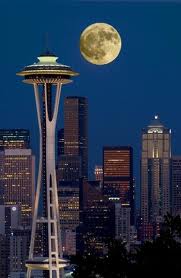 Was Seattle the eye of the storm that brought several of the Web’s leading hosted Internet services to a standstill and hundreds of Web stakeholders to wonder whether Amazon Web Services was the future, or the bitter end, of reliable cloud computing online? Well, no and no!
Was Seattle the eye of the storm that brought several of the Web’s leading hosted Internet services to a standstill and hundreds of Web stakeholders to wonder whether Amazon Web Services was the future, or the bitter end, of reliable cloud computing online? Well, no and no!
Amazon’s Web services outage did continue through week’s end fueling debate over the future of cloud computing. But Amazon has data centers located around the world, and the current problems came from its center in Northern Virginia, near Dulles airport. Companies like Netflix who had taken full advantage of Amazon Web Services’ redundant cloud architecture, sailed through the outage unscathed. That’s because Netflix, which insures against technical malfunctions in any one location, said Steve Swasey, a Netflix spokesman, was protected against any single center’s interruption. Think of it as a cost of doing business.
 Conversely, BigDoor, a 20-employee start-up in Seattle, was knocked down by Amazon’s travails. It had backup and recovery services with Amazon, said Keith Smith, the chief executive, but only at Amazon’s data center in Virginia. “There’s always a trade-off,” Mr. Smith said, noting the expenses and developer time that would have been required to do more.
Conversely, BigDoor, a 20-employee start-up in Seattle, was knocked down by Amazon’s travails. It had backup and recovery services with Amazon, said Keith Smith, the chief executive, but only at Amazon’s data center in Virginia. “There’s always a trade-off,” Mr. Smith said, noting the expenses and developer time that would have been required to do more.
Amazon’s Web page on the status of its cloud services said on Friday that matters were improving but were still not completely resolved. A company spokeswoman said the updates would be Amazon’s only comment for now. Amazon has thousands of corporate customers, from Pfizer and Netflix to legions of start-ups, whose businesses often live on Amazon Web Services. Those reporting service troubles included Foursquare, a location-based social networking site; Quora, a question-and-answer service; Reddit, a news-sharing site; and BigDoor, which makes game tools for Web publishers.
Amazon’s Elastic Compute Cloud service plays host to thousands of major web sites that rely upon it to serve pages to users. So when the EC 2 service goes down, so do the Web sites. It’s a huge setback for an industry that is supposed to grow to $55 billion by 2014, according to market researcher IDC.
The duration of the outage has surprised many, since Amazon has a lot of backup computing infrastructure. If Amazon can’t safeguard the cloud, how can we rely upon it so? So the debate begins on the future of cloud computing and what to do to make users and companies put their trust in cloud vendors such as Amazon. [24×7]
 Comcast Unveils Ultra-Fast Internet Service in Seattle
Comcast Unveils Ultra-Fast Internet Service in Seattle
Comcast Corp. has unveiled its ultra-fast Extreme 105 Internet service in Seattle, delivering 105 megabits-per-second download speed and up to 10 Mbps upload. The service costs $105 per month for 12 months as part of Comcast’s Triple Play bundle of Internet, phone and cable television services.
At top speed, the Extreme 105 would allow customers to download a full-length, high-definition movie in just 5 minutes, and a standard-definition television show in just 20 seconds. Stay tuned to Seattle24x7 for a comprehensive, close-up interview on Internet speed, latency and quality with Doug Suttles, CTO of Ookla, parent of Speedtest.net, in the days ahead. [24×7]
Seattle Netrepreneuer Naveen Jain Reaching for the Moon
Naveen Jain shared with colleagues at the annual Explorers Club Awards Dinner in New York that he is Co-Founder and Chairman of Moon Express, Inc., winner of a $10M NASA commercial lunar contract and a leading contender for the $30M Google Lunar X PRIZE. Why is Naveen reaching for the Moon? He explained, “This is an extremely exciting project as Moon exploration is vital to solving Earth’s present and future resource problems.”

It was NASA’s creation and rapid deployment of its Innovative Lunar Demonstration Data program that convinced Naveen to invest in Moon Express. “NASA’s proactive efforts to embrace the commercial sector have created an environment of balanced risk and opportunity reminiscent of America’s efforts to open its western frontiers to commerce,” he said. “Moon Express is aptly named to honor the historic public-private railway partnerships that led to national growth and prosperity, but instead of crossing the frontiers, with Moon Express we will be crossing the stars.”
Moon Express was founded by Naveen and his two co-founders: Dr. Robert (Bob) Richards, a founder of International Space University, who serves as CEO, and well known Silicon Valley entrepreneur and former NASA manager, Dr. Barney Pell, Chief Architect for Bing Local Search at Microsoft, who serves as Vice Chairman and Chief Technology Officer. All three Moon Express co-founders also work together as trustees of Singularity University based at the NASA Ames Research Park. [24×7]



















